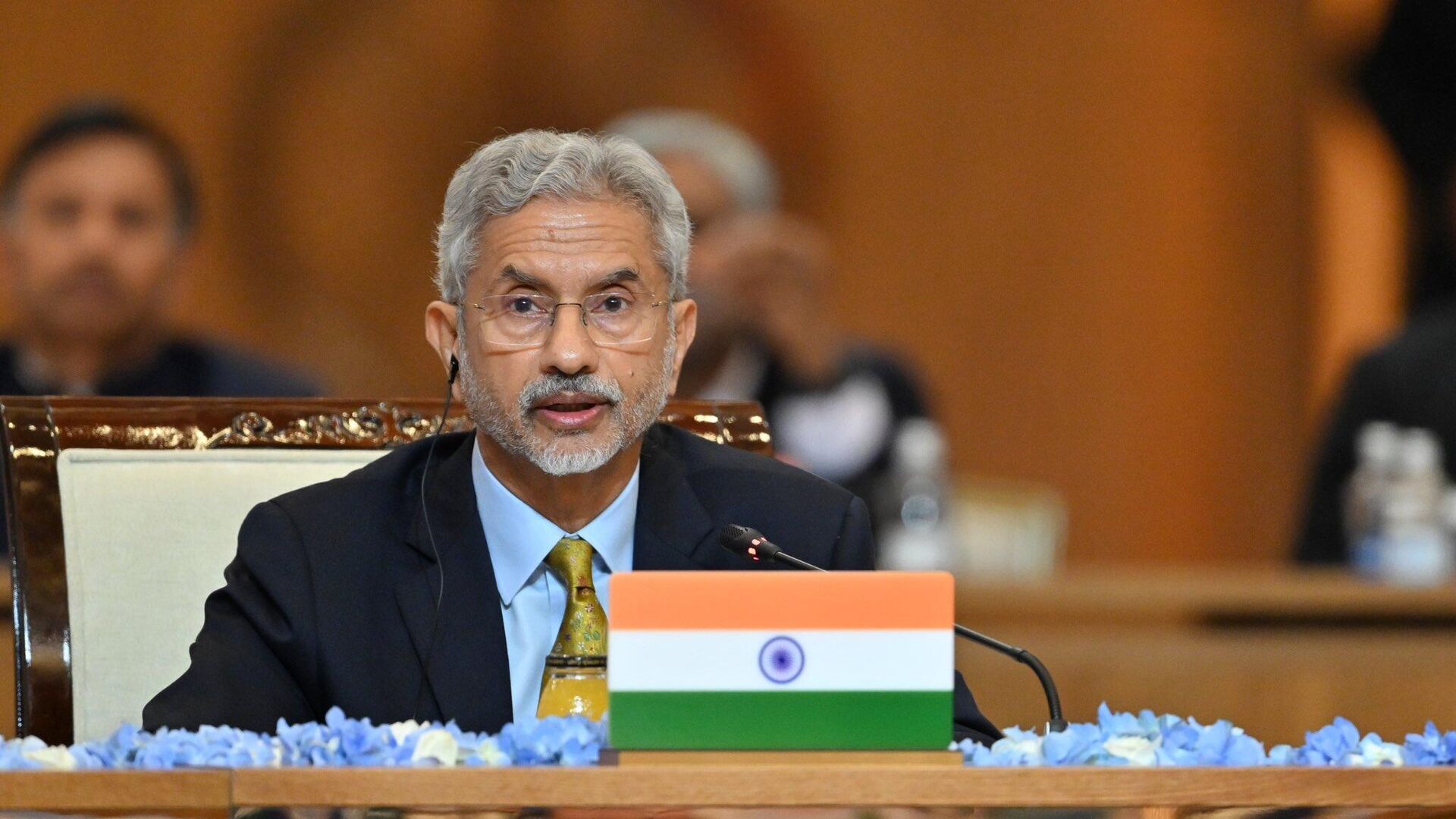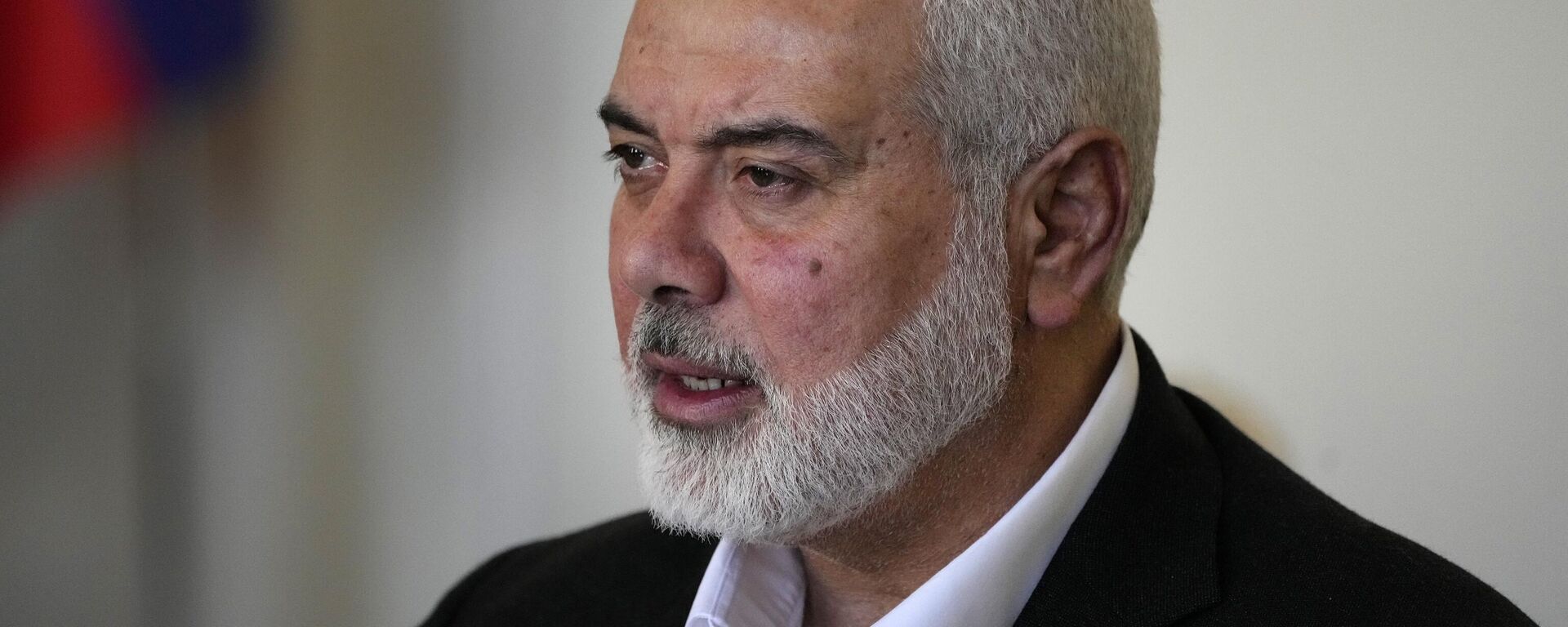https://sputniknews.in/20241125/india-looking-to-enhance-communication-between-iran--israel-eam-jaishankar-8440546.html
India Looking to Enhance Communication Between Iran & Israel: EAM Jaishankar
India Looking to Enhance Communication Between Iran & Israel: EAM Jaishankar
Sputnik India
External Affairs Minister (EAM) S Jaishankar has said that New Delhi was in touch with both Iran and Israel at the "highest levels" in order to enhance communication between the two main players in the conflict in the Middle-East.
2024-11-25T17:18+0530
2024-11-25T17:18+0530
2024-11-25T17:20+0530
s. jaishankar
narendra modi
vladimir putin
india
iran
new delhi
indian navy
persian gulf (arabian gulf)
gulf countries
africa
https://cdn1.img.sputniknews.in/img/07e8/07/04/7777860_0:0:2049:1153_1920x0_80_0_0_4d7bcc27071308832b8c3987a0f70b2c.jpg
External Affairs Minister (EAM) S Jaishankar has said that India has been in touch with both Iran and Israel at the "highest levels" in order to enhance communication between the two major players in the Middle East tensions.Highlighting India's stakes in Lebanon, Jaishankar said that an Indian contingent was serving there as part of the United Nations Interim Force In Lebanon (UNIFIL).Further, the top Indian diplomat noted that Indian Navy warships had been deployed in the Gulf of Aden and the northern part of Arabian Sea in order to protect international shipping lanes which have faced repercussions due to the Gaza conflict.Describing the situation in the Middle-East as "deeply concerning" and expressing apprehensions about the future scenario, Jaishankar reiterated India's condemnation of "terrorism and hostage-taking".Jaishankar remarked that the ongoing conflicts had made supply chains "insecure" and disrupted connectivity."I also flag your attention to the I2U2 grouping. Expect it to be more active in times to come," he said.Dwelling on India's interests in the Middle-East and North Africa (MENA) region, Jaishankar said that New Delhi's two-way trade with the region was around $180-200 billion and more than 9 million Indian citizens were present there.Focussing on the Ukraine conflict, Jaishankar told the conference addressing the situation was an "urgent imperative of our times".Jaishankar noted that Prime Minister Narendra Modi had personally engaged with both President Vladimir Putin and Volodymyr Zelensky during the Indian leader's visits to Moscow and Kiev in July and August.
https://sputniknews.in/20240731/israels-strategy-of-assassination-pushing-iran-into-direct-war-in-mena-7943994.html
india
iran
new delhi
persian gulf (arabian gulf)
gulf countries
africa
ukraine
global south
italy
Sputnik India
feedback.hindi@sputniknews.com
+74956456601
MIA „Rossiya Segodnya“
2024
Dhairya Maheshwari
https://cdn1.img.sputniknews.in/img/07e6/0c/13/138962_0:0:641:640_100x100_80_0_0_2cb44360dbcdf6d84bf4b299cd045917.jpg
Dhairya Maheshwari
https://cdn1.img.sputniknews.in/img/07e6/0c/13/138962_0:0:641:640_100x100_80_0_0_2cb44360dbcdf6d84bf4b299cd045917.jpg
News
en_IN
Sputnik India
feedback.hindi@sputniknews.com
+74956456601
MIA „Rossiya Segodnya“
Sputnik India
feedback.hindi@sputniknews.com
+74956456601
MIA „Rossiya Segodnya“
Dhairya Maheshwari
https://cdn1.img.sputniknews.in/img/07e6/0c/13/138962_0:0:641:640_100x100_80_0_0_2cb44360dbcdf6d84bf4b299cd045917.jpg
israeli gaza war, israel hostages, gaza ceasefire, iran nuclear deal, iran news, iran israel, iran israel war, houthi attacks, modi putin meeting, modi putin summit, ukraine long range missiles, russia irbm, nato expansion, putin warning
israeli gaza war, israel hostages, gaza ceasefire, iran nuclear deal, iran news, iran israel, iran israel war, houthi attacks, modi putin meeting, modi putin summit, ukraine long range missiles, russia irbm, nato expansion, putin warning
India Looking to Enhance Communication Between Iran & Israel: EAM Jaishankar
17:18 25.11.2024 (Updated: 17:20 25.11.2024) India had always been willing to "contribute meaningfully to any international diplomatic endeavours" due to its capacity to engage various parties, Jaishankar underscored.
External Affairs Minister (EAM) S Jaishankar has said that India has been in touch with both Iran and Israel at the "highest levels" in order to enhance communication between the two major players in the Middle East tensions.
"Our concerns have also been increasing on the widening of the conflict. We have been in regular touch with both Israel and Iran at the highest levels to advocate restraint and enhance communication," Jaishankar told the Rome Mediterranean Dialogue in the Italian capital on Monday.
Highlighting India's stakes in Lebanon, Jaishankar said that an Indian contingent was serving there as part of the United Nations Interim Force In Lebanon (UNIFIL).
Further, the top Indian diplomat noted that
Indian Navy warships had been deployed in the Gulf of Aden and the northern part of Arabian Sea in order to protect international shipping lanes which have faced repercussions due to the Gaza conflict.
Describing the situation in the Middle-East as "deeply concerning" and expressing apprehensions about the future scenario, Jaishankar reiterated India's condemnation of "terrorism and hostage-taking".
"It (India) also regards large scale civilian casualties in military operations to be unacceptable. International humanitarian law cannot be disregarded. In immediate terms, we should all support a ceasefire. India has also extended relief directly and through United Nations Relief and Works Agency for Palestine Refugees in the Near East (UNRWA)," Jaishankar said. "In the longer term, it is imperative that the future of the Palestinian people be addressed. India favours a two-state solution."
Jaishankar remarked that the ongoing conflicts had made supply chains "insecure" and disrupted connectivity.
The top diplomat said that the Middle-East tensions had been a "major complication" for the India-Middle East-Europe Economic Corridor (IMEEC), adding that the connectivity initiative had nevertheless been "proceeding" on the eastern side, especially between India, UAE and Saudi Arabia.
"I also flag your attention to the I2U2 grouping. Expect it to be more active in times to come," he said.
Dwelling on India's interests in the Middle-East and North Africa (MENA) region, Jaishankar said that New Delhi's two-way trade with the region was around $180-200 billion and more than 9 million Indian citizens were present there.
"Whether it is energy, technology, industrial projects or services, we have big stakes. It is also a region to which we are connected in history, culture and security," the foreign minister said.
Focussing on the Ukraine conflict, Jaishankar told the conference addressing the situation was an "urgent imperative of our times".
"What is clear is that no solution is going to emerge from the battlefield. India has consistently held the view that disputes in this era cannot be settled by war. There must be a return to dialogue and diplomacy; the sooner the better," he said, noting that this was a "widespread sentiment" in Global South.
Jaishankar noted that Prime Minister Narendra Modi had
personally engaged with both President Vladimir Putin and Volodymyr Zelensky during the Indian leader's visits to Moscow and Kiev in July and August.
"Our senior officials remain in continuous touch. We firmly believe that those who have the ability to explore finding common ground must step up to that responsibility," he said.



